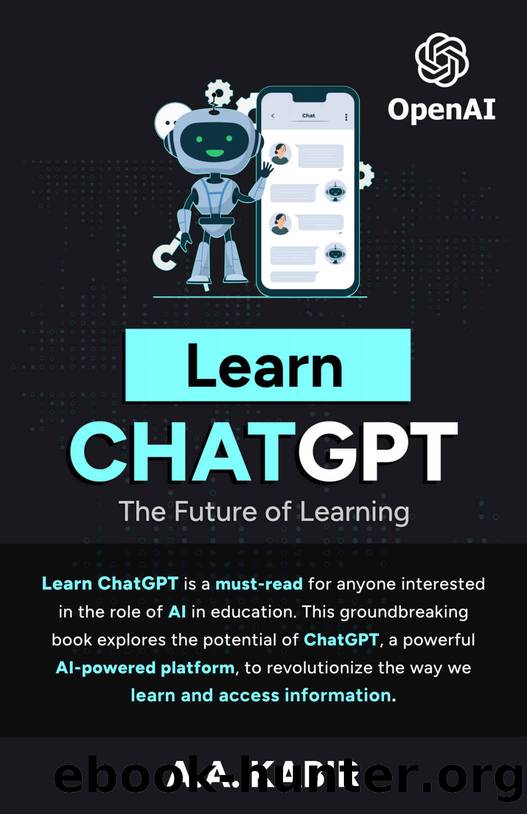Learn ChatGPT: The Future of Learning by A.A. KABIR

Author:A.A. KABIR [KABIR, A.A.]
Language: eng
Format: mobi
Published: 2022-12-08T00:00:00+00:00
Chapter 6
Advanced features of ChatGPT, including language translation and question answering
How ChatGPT can help you with language translation
ChatGPT is not specifically designed for language translation, but it can still be useful for this purpose. Because ChatGPT is a large language model that is trained on a wide range of text data, it can understand and generate responses in multiple languages.
To use ChatGPT for language translation, you can provide the model with input in one language, and it will generate a response in the same language. You can then use the response as a translation of the input. For example, if you provide ChatGPT with input in French, it will generate a response in French that you can use as a translation of the input.
One advantage of using ChatGPT for language translation is that it can provide a more natural and human-like translation than a traditional machine translation system. Because ChatGPT is trained on a large amount of text data, it can generate responses that are more fluent and natural-sounding than those produced by other machine translation systems.
Overall, ChatGPT can be useful for language translation, although it is not specifically designed for this purpose. By providing the model with input in one language, you can use ChatGPT to generate a response in the same language that can be used as a translation of the input. This can provide a more natural and human-like translation than traditional machine translation systems.
Using ChatGPT to answer complex questions and provide information
One of the key capabilities of ChatGPT is its ability to answer complex questions and provide information. Because ChatGPT is a large language model that is trained on a wide range of text data, it can understand and respond to a variety of questions and requests for information.
To use ChatGPT to answer complex questions and provide information, you can provide the model with a prompt or question that sets the stage for the conversation. For example, you could ask ChatGPT "What is the capital of France?" or "Can you tell me more about the history of the Eiffel Tower?" The model will then generate a response that provides the requested information in a natural and human-like way.
One advantage of using ChatGPT to answer complex questions and provide information is that it can provide a more natural and human-like response than a traditional information retrieval system. Because ChatGPT is trained on a large amount of text data, it can generate responses that are more fluent and natural-sounding than those produced by other information retrieval systems.
Overall, ChatGPT is well-suited for answering complex questions and providing information. By providing the model with a prompt or question, you can use ChatGPT to generate a response that provides the requested information in a natural and human-like way. This can be useful for applications such as customer service, where users expect to be able to have conversations with the chatbot in a natural and human-like way.
Advanced applications of ChatGPT's natural language processing capabilities
There are many advanced applications of ChatGPT's natural language processing capabilities.
Download
This site does not store any files on its server. We only index and link to content provided by other sites. Please contact the content providers to delete copyright contents if any and email us, we'll remove relevant links or contents immediately.
Exploring Deepfakes by Bryan Lyon and Matt Tora(8363)
Robo-Advisor with Python by Aki Ranin(8305)
Offensive Shellcode from Scratch by Rishalin Pillay(6427)
Microsoft 365 and SharePoint Online Cookbook by Gaurav Mahajan Sudeep Ghatak Nate Chamberlain Scott Brewster(5676)
Ego Is the Enemy by Ryan Holiday(5407)
Management Strategies for the Cloud Revolution: How Cloud Computing Is Transforming Business and Why You Can't Afford to Be Left Behind by Charles Babcock(4562)
Python for ArcGIS Pro by Silas Toms Bill Parker(4500)
Machine Learning at Scale with H2O by Gregory Keys | David Whiting(4289)
Elevating React Web Development with Gatsby by Samuel Larsen-Disney(4222)
Liar's Poker by Michael Lewis(3436)
Learning C# by Developing Games with Unity 2021 by Harrison Ferrone(3350)
Speed Up Your Python with Rust by Maxwell Flitton(3310)
OPNsense Beginner to Professional by Julio Cesar Bueno de Camargo(3275)
Extreme DAX by Michiel Rozema & Henk Vlootman(3256)
Agile Security Operations by Hinne Hettema(3187)
Linux Command Line and Shell Scripting Techniques by Vedran Dakic and Jasmin Redzepagic(3170)
Essential Cryptography for JavaScript Developers by Alessandro Segala(3141)
Cryptography Algorithms by Massimo Bertaccini(3082)
AI-Powered Commerce by Andy Pandharikar & Frederik Bussler(3039)
